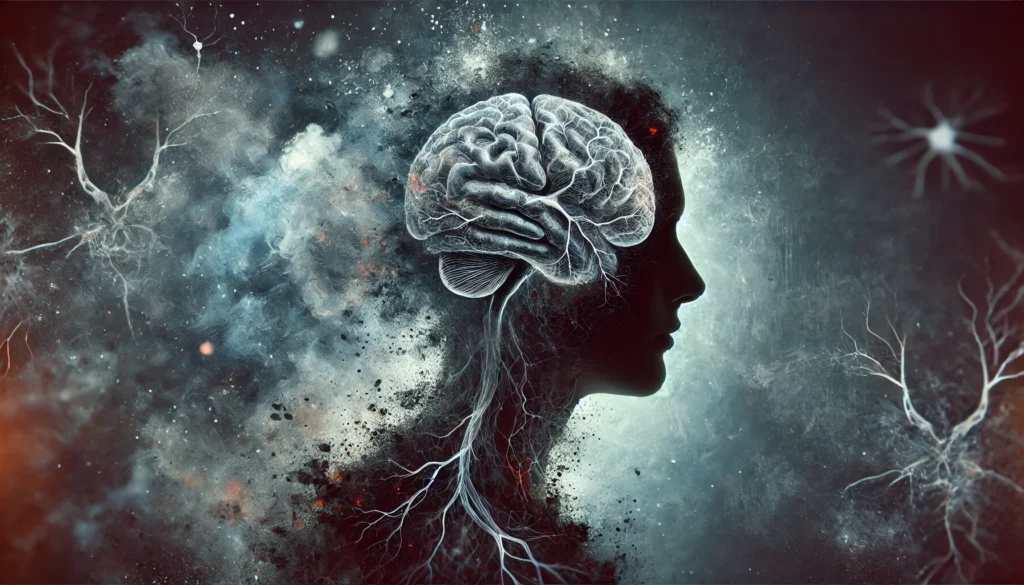Introduction
When a person begins to experience changes in their perception, memory, behavior, or ability to reason, it often raises a chilling question: are these the signs of a person losing their mind? While this phrase is commonly used in casual conversations, it masks a deeply concerning and complex medical reality. These perceived shifts can be caused by a broad range of neurological, psychiatric, and physical conditions. As the stigma surrounding mental health slowly dissolves and society becomes more aware of the importance of cognitive and emotional wellness, recognizing the early symptoms of losing your mind has never been more crucial.
You may also like: Do Carbs Cause Brain Fog? What Science Reveals About Carbohydrates and Mental Clarity
There is no single symptom or clear-cut signal that definitively marks the onset of cognitive breakdown. Rather, the process may involve subtle, gradual changes that unfold over weeks or months. What starts as a minor memory lapse or an unexplained emotional outburst can eventually manifest into full-blown confusion, delusional thoughts, or a detachment from reality. Unfortunately, many individuals and their families ignore or misattribute these red flags until the condition becomes severe.
This article explores the multifaceted dimensions of what it means when someone appears to be “losing their mind”—medically known as cognitive or psychiatric deterioration. We will delve into what current science and clinical experience reveal about causes, early warning signs, diagnosis, and treatment options. From the role of stress, trauma, and neurodegeneration to the intersection of mood disorders and psychosis, our goal is to provide clarity and compassion for a topic often clouded in fear and misunderstanding.
Understanding these symptoms early allows for timely intervention, better outcomes, and the possibility of reversing or halting progression in many cases. This is not merely a study in decline, but a journey toward greater awareness, empathy, and healing.

Understanding the Concept: What Does It Mean to “Lose Your Mind”?
The phrase “losing your mind” often conjures dramatic imagery—paranoia, hallucinations, or people talking to themselves incoherently. However, the reality is usually far more nuanced. This colloquial expression often refers to a decline in mental faculties that may involve memory loss, disorientation, emotional instability, irrational behavior, or an inability to distinguish reality from fantasy. While these can be signs of a person losing their mind, they are not a definitive diagnosis in themselves. Instead, they can point toward a range of conditions, including neurodegenerative diseases, psychiatric disorders, or severe physiological imbalances.
In the scientific and clinical community, this phenomenon is better described through structured terms such as acute psychosis, major depressive episodes with psychotic features, early-onset dementia, delirium, schizophrenia, or bipolar disorder. Cognitive impairments from traumatic brain injury, autoimmune encephalitis, substance use disorders, or even vitamin deficiencies can also mirror these symptoms.
A key distinction lies in duration and reversibility. For instance, stress-induced dissociation might resolve with therapy, while progressive conditions like Alzheimer’s disease or frontotemporal dementia may worsen without early intervention. Thus, the ability to correctly identify the early symptoms of losing your mind becomes critical in determining the best course of action and hope for recovery.

Early Behavioral Symptoms That Suggest Cognitive or Psychiatric Decline
Changes in personality or daily functioning are often among the first signs of a person losing their mind. Family members may notice the individual behaving unusually—displaying anger over trivial matters, showing signs of paranoia, or retreating from social activities they once enjoyed. These shifts are easy to misinterpret as stress, mood swings, or eccentricity, especially in high-functioning individuals. However, dismissing these behaviors without a deeper look can lead to missed opportunities for early diagnosis.
Emotional volatility is a strong early symptom. Individuals may cry uncontrollably, experience intense anxiety, or exhibit disproportionate rage. These emotional shifts may also coincide with depression, a loss of motivation, or an inability to feel pleasure—formally referred to as anhedonia. In some cases, individuals begin to express nihilistic or paranoid thoughts, such as believing others are watching them or that their lives have no value.
As these emotional disturbances become more frequent or intense, they may be accompanied by self-isolation, erratic decision-making, or unusual rituals. These behaviors may not always seem severe at first glance, but when viewed in context, they often point to underlying psychiatric or neurological changes that require immediate attention.
Cognitive and Perceptual Symptoms: When Reality Begins to Blur
One of the most terrifying symptoms of losing your mind is the blurring line between reality and delusion. Cognitive decline may present as persistent forgetfulness, difficulty concentrating, disorganized speech, or an inability to follow simple tasks. These are hallmark signs often seen in dementia, schizophrenia, or major depressive disorder with psychotic features. In more severe cases, individuals may begin to hallucinate—seeing or hearing things that are not there—or hold tightly to beliefs that are clearly false.
Hallucinations and delusions are among the most distressing experiences both for the person undergoing them and their loved ones. The person may hear voices, often critical or commanding, that others cannot hear. They might believe their thoughts are being broadcast or that someone is trying to control their mind. These episodes can lead to severe anxiety, social withdrawal, or even aggressive behavior.
Disorganized thinking may appear in conversations where the individual jumps from topic to topic with no logical connection, a phenomenon known as “flight of ideas.” Alternatively, they may exhibit “thought blocking,” where they abruptly stop speaking mid-sentence, unable to recall what they were saying.
These are not simply signs of stress or emotional fatigue; they are serious indicators that professional assessment is urgently needed. When these cognitive disruptions are paired with emotional instability, they strongly support the notion that someone may be in the early stages of losing their grip on reality.

Physical and Neurological Changes That Accompany Mental Decline
While mental and emotional changes are usually the first to be noticed, physical symptoms often accompany the signs of a person losing their mind. These can include changes in sleep patterns, appetite, motor coordination, or the development of strange tics or repetitive behaviors. For example, someone may pace back and forth for hours, exhibit tremors, or develop facial grimaces without explanation.
In neurodegenerative conditions like Parkinson’s disease or Huntington’s disease, these physical symptoms may precede or accompany cognitive and emotional deterioration. Neurological imaging in such cases often shows structural changes in the brain, such as atrophy in specific regions, which help confirm a diagnosis.
Sensory issues may also arise—like hypersensitivity to light or sound—which can overwhelm individuals and contribute to their distress. In rare autoimmune brain disorders like anti-NMDA receptor encephalitis, individuals may have seizures, develop speech difficulties, and exhibit dramatic psychiatric changes, often misdiagnosed initially as a mental breakdown.
Physical symptoms must always be considered in context with cognitive and emotional indicators. The combination of subtle neurological changes with behavioral abnormalities provides a more complete picture of what may be unfolding internally. It underscores the need for multi-disciplinary evaluation—neurologists, psychiatrists, and general practitioners all play a role in accurate diagnosis and effective treatment.
Common Causes and Underlying Conditions
Understanding the symptoms of losing your mind requires identifying the root cause. Several medical, psychological, and situational conditions can trigger such symptoms. These include:
1. Neurodegenerative Diseases:
Alzheimer’s disease, Lewy body dementia, frontotemporal dementia, and other forms of age-related brain deterioration often begin subtly before progressing into full cognitive breakdown.
2. Psychiatric Disorders:
Schizophrenia, schizoaffective disorder, bipolar disorder, and major depressive disorder with psychotic features are common psychiatric causes where cognitive disruption is prominent.
3. Substance Abuse:
Long-term use of alcohol, benzodiazepines, amphetamines, or hallucinogens can result in substance-induced psychosis or irreversible cognitive impairment.
4. Trauma and PTSD:
Psychological trauma, especially in early life or post-combat situations, can lead to dissociation, intrusive thoughts, paranoia, or depression that mimics signs of mental unraveling.
5. Infections and Inflammation:
Brain infections such as encephalitis or meningitis, or even systemic infections in the elderly, can cause acute delirium, confusion, and hallucinations.
6. Metabolic or Nutritional Deficiencies:
Severe vitamin B12 deficiency, hypothyroidism, or hepatic encephalopathy due to liver failure are reversible causes often mistaken for psychiatric conditions.
7. Autoimmune Disorders:
Some autoimmune conditions attack brain tissue, leading to sudden psychiatric symptoms, memory loss, and erratic behavior.
Each of these root causes presents with unique symptom clusters, but they all share overlapping characteristics that can resemble the classic signs of a person losing their mind. This overlap is why professional evaluation is critical, as treatments can vary dramatically based on the underlying pathology.

Diagnostic Approach and Medical Evaluation
When signs of mental or cognitive decline are suspected, a comprehensive medical evaluation becomes essential. This begins with a detailed history, including onset, frequency, and duration of symptoms. Physicians will also examine family history of mental illness, any recent trauma, substance use, and other medical conditions.
Neurological examinations and cognitive tests are often conducted to assess memory, attention, language, and executive functioning. Tools like the Mini-Mental State Examination (MMSE) or Montreal Cognitive Assessment (MoCA) provide measurable baselines to monitor progression or improvement over time.
In many cases, neuroimaging such as MRI or CT scans is used to detect structural abnormalities, while blood tests may identify vitamin deficiencies, infections, autoimmune markers, or hormonal imbalances. In psychiatric evaluations, clinicians look for patterns that match diagnostic criteria found in the DSM-5 (Diagnostic and Statistical Manual of Mental Disorders).
Collaboration between mental health professionals and primary care providers is crucial. Ruling out organic causes before concluding a purely psychiatric diagnosis ensures that reversible or treatable conditions are not overlooked. Often, what appears to be psychiatric decline turns out to be a fixable physiological imbalance—proving the value of thorough, cross-disciplinary diagnosis.
Treatment Strategies and Evidence-Based Interventions
The treatment of symptoms of losing your mind varies greatly depending on the diagnosis, severity, and individual needs of the patient. In most cases, an integrative approach yields the best outcomes. Pharmacological treatments may include antipsychotics, antidepressants, mood stabilizers, or cognitive enhancers like donepezil for dementia. These medications aim to stabilize mood, reduce psychosis, or slow cognitive decline.
Psychotherapy remains a cornerstone of care, especially for those with trauma, mood disorders, or early-stage psychosis. Cognitive Behavioral Therapy (CBT), Acceptance and Commitment Therapy (ACT), and Dialectical Behavior Therapy (DBT) are widely used to help patients manage their thoughts, behaviors, and emotions.
Lifestyle interventions—such as improved sleep hygiene, nutrition, physical exercise, and stress reduction—also play a critical role. Social engagement and cognitive training exercises have been shown to slow cognitive decline and improve quality of life in early-stage dementia or mild cognitive impairment.
In certain cases, hospitalization or intensive outpatient programs are necessary to ensure safety, particularly when individuals exhibit suicidal ideation, severe psychosis, or an inability to care for themselves. Family support and education are also key components, helping loved ones understand what’s happening and how best to assist.
Ultimately, treatment is not about “curing” someone of losing their mind, but rather stabilizing, managing, and where possible, reversing the factors contributing to their condition. Early and sustained intervention dramatically improves prognosis and helps restore dignity and functionality to those affected.
Frequently Asked Questions
1. What are the most subtle early signs of a person losing their mind?
The earliest signs are often subtle behavioral and emotional changes that go unnoticed or are dismissed as stress. These can include sudden mood swings, persistent sadness, social withdrawal, or unusual beliefs that seem out of character. Over time, these may escalate into more serious symptoms like paranoia or hallucinations. Detecting these initial changes can be challenging, especially when they don’t disrupt daily functioning immediately, but they often serve as a crucial window for early intervention.
2. Can symptoms of losing your mind come and go?
Yes, many conditions that present as cognitive or psychiatric deterioration are episodic. For example, bipolar disorder features alternating periods of mania and depression, while early-stage dementia might include fluctuating awareness. Conditions like delirium can wax and wane based on underlying medical triggers. This variability makes it important to track symptoms over time and seek professional evaluation even if they seem to resolve temporarily.
3. How do doctors differentiate between mental illness and physical illness when diagnosing mental decline?
Medical professionals use a combination of psychological assessments, neurological exams, blood tests, and imaging studies to distinguish between mental and physical causes of cognitive changes. For instance, a vitamin deficiency might cause memory issues similar to depression or dementia but would show up in bloodwork and respond to supplementation. By ruling out treatable physiological factors first, doctors ensure that mental health diagnoses are accurate and not masking other medical issues.
4. Is it possible for high-functioning individuals to hide signs of cognitive decline?
Absolutely. Many people experiencing early symptoms of losing your mind are adept at masking their struggles, especially those in high-responsibility or public roles. They may overcompensate by being overly meticulous, scripting conversations, or avoiding challenging situations. This concealment often delays diagnosis, making it vital for close family members or colleagues to notice changes in emotional responses, communication, and memory recall.
5. Can extreme stress or trauma make someone feel like they’re losing their mind?
Yes, chronic stress or acute trauma can lead to dissociation, intrusive thoughts, panic attacks, and emotional numbness—symptoms that are often mistaken for psychiatric illness. In some cases, trauma can even trigger psychosis or catatonia. Post-traumatic stress disorder (PTSD) often includes vivid flashbacks, emotional outbursts, and cognitive disruption, all of which may resemble the signs of a person losing their mind.
6. How long can someone experience symptoms before diagnosis?
The duration varies widely. Some people may show signs for years before receiving a diagnosis, especially if symptoms are mild or intermittent. Others may decline rapidly over a few weeks. Early detection depends heavily on awareness, access to healthcare, and support from family or community. Many individuals suffer in silence due to stigma, further delaying the help they need.
7. Are symptoms of losing your mind always permanent?
Not necessarily. Many causes of mental deterioration are reversible or manageable with appropriate treatment. For instance, cognitive impairment due to a B12 deficiency, thyroid disorder, or substance abuse can be reversed with medical intervention. Even psychiatric conditions like depression or psychosis can be treated effectively. The key is timely diagnosis and tailored, sustained treatment.
8. Can aging alone be a reason for mental decline?
Aging increases the risk of cognitive decline but is not a direct cause. While mild forgetfulness is common with aging, severe changes in memory, reasoning, or perception are not a normal part of aging. If symptoms escalate or interfere with daily life, they should be evaluated to rule out conditions like dementia, depression, or other treatable disorders.
9. What role do genetics play in someone losing their mind?
Genetics can increase the risk of certain conditions like schizophrenia, bipolar disorder, or Alzheimer’s disease. However, genetics are rarely the sole factor. Environmental influences, stress, trauma, and lifestyle choices all interact with genetic predispositions. Understanding family history helps guide diagnostic evaluations and may inform preventive strategies.
10. What should I do if I suspect someone I love is showing signs of mental breakdown?
Approach the situation with compassion and avoid judgmental language. Encourage open conversations about how they’re feeling and suggest visiting a healthcare provider for a professional assessment. Provide reassurance that mental health conditions are medical in nature and that help is available. Early support can be life-changing and potentially life-saving.

Conclusion
Recognizing the signs of a person losing their mind is not an act of fear—it is an act of love, awareness, and medical responsibility. These symptoms are not character flaws or mere eccentricities; they are cries from the brain, asking to be understood and treated with compassion and clinical precision. Whether the symptoms arise from neurodegenerative disease, trauma, psychiatric illness, or a treatable medical imbalance, the earlier we acknowledge and act, the better the outcome.
By understanding the full spectrum of symptoms of losing your mind, families and individuals can move from fear to empowerment. They can advocate for assessments, treatments, and community support that restores dignity and offers hope. The road to recovery is not always straight or swift, but it is often possible—especially when science, compassion, and awareness walk hand in hand. Every person experiencing cognitive or emotional decline deserves to be seen not as broken, but as someone facing a complex medical challenge that merits care, expertise, and unwavering support.
Was this article helpful? Don’t let it stop with you. Share it right now with someone who needs to see it—whether it’s a friend, a colleague, or your whole network. And if staying ahead on this topic matters to you, subscribe to this publication for the most up-to-date information. You’ll get the latest insights delivered straight to you—no searching, no missing out.
Further Reading:
My Brain Is Fried: Scientific Reasons Your Mind Feels Overworked and What to Do About It
Metabolic Confusion Diet Plan: How to Boost Fat Loss With Science



